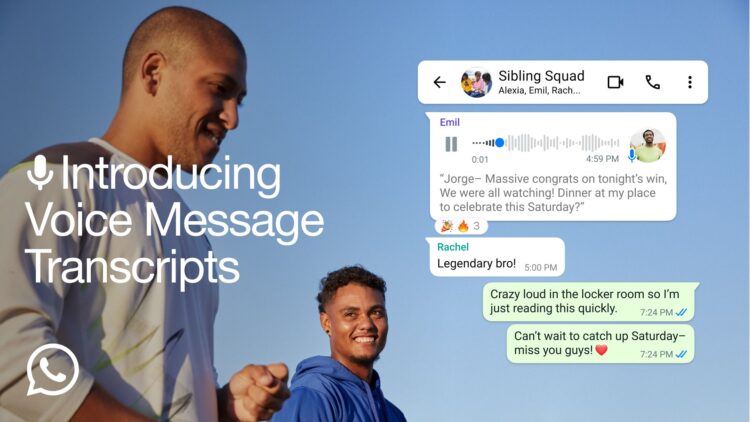WhatsApp is rolling out voice message transcripts globally, allowing users to read transcriptions of audio messages for added convenience. This feature is designed for those in loud environments who cannot listen to voice messages. It became available on November 21, 2024.
The new voice message transcription feature converts audio into text, enabling users to engage in conversations without playing the audio. WhatsApp’s parent company, Meta, explained that this functionality enhances the voice messaging experience, which is particularly personal and valuable for connecting with friends and family, especially when situations make listening impractical.
WhatsApp’s latest update turns voice messages into instant texts
Users can activate transcripts by navigating to their app settings, selecting “Chats,” and turning on the “Voice message transcripts” option. After enabling the feature, users can obtain a transcript by long-pressing a voice message and tapping “transcribe.” This allows for greater control, as transcripts are not generated automatically for every message.
The initial rollout will support a limited number of languages, which varies according to the operating system. For iOS users with version 16 or above, supported languages include English, Spanish, French, German, Italian, Japanese, Korean, Portuguese, Russian, Turkish, Chinese, and Arabic. Those with iOS 17 and above will have additional language options, including Danish, Finnish, Malay, Norwegian, Dutch, Swedish, Hebrew, and Thai.
For Android users, transcripts will initially support English, Portuguese, Spanish, and Russian. WhatsApp plans to expand its language support, suggesting that more languages could be included in future updates as the feature becomes more widely adopted.
Comparison with other platforms
WhatsApp’s introduction of voice message transcription mirrors a feature already available on Apple’s Messages app, implemented with the iOS 17 update last year. Apple’s platform allows for audio transcription in multiple languages and has a more extensive range of supported options than WhatsApp’s current offerings.
Despite WhatsApp’s narrower focus on supported languages at launch, the on-device processing of transcriptions ensures user privacy, as no external access is granted to the transcripts. Meta emphasized the importance of this privacy feature, stating that “all transcriptions are processed on-device after the audio message is downloaded.” This management of transcriptions aims to address privacy concerns prevalent in digital communications.
The voice message transcription functionality represents a significant step in enhancing user accessibility within messaging applications. It allows users to participate in discussions even when audio playback is inconvenient. As messaging applications evolve, these features will likely become essential, catering to diverse user needs and preferences.
Meta is gradually rolling out this feature, which is expected to reach all users over the coming weeks. With increased digital communication tools prioritizing user experience and accessibility, WhatsApp’s advancements may reinforce its standing in the competitive landscape against other messaging platforms like Apple’s iMessage, which already possesses more comprehensive transcription capabilities.
Image credit: WhatsApp





